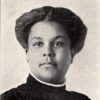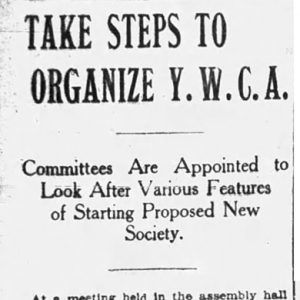calsfoundation@cals.org
Young Women's Christian Association (YWCA)
aka: YWCA
From its beginnings in 1858, the Young Women’s Christian Association (YWCA) has been dedicated to bringing women together to consider, discuss, and ameliorate America’s racial, social, and economic ills. Fueled with, and informed by, the spirit of progressive reform, the YWCA’s largely Protestant, middle-class membership was further engaged in “Christian social work,” or community activism, which was directed particularly at women less fortunate than themselves. In Arkansas, the best known YWCA was located in Little Rock (Pulaski County).
Founded in 1911, the Little Rock YWCA, which was located at 4th and Scott streets, was organized to assist women and girls in the community by providing them with access to education, recreational activities, employment, and lodging. Its original founders were Mery Omily Hall, Laura Bunch, Clara Lenon, and Nellie Dooley. Throughout the years, the YWCA offered courses in English, French, and German, as well as courses in embroidery, hygiene, and physical education. Many of its activities were supported by the Community Chest of Little Rock, the predecessor of the United Way. Little Rock YWCA members also supported a summer camp in Benton (Saline County) on the Saline River. Another of their objectives was ensuring that young women and girls were provided with religious instruction. In fact, in its constitution, the Little Rock YWCA asserted that its purpose was to “advance the physical, social, intellectual, moral and spiritual interests of young women.” Members encouraged attendance of the YWCA’s weekly Bible classes and its monthly vesper services.
For all of its lofty goals, particularly its dedication to the religious and educational development of all women, the Little Rock YWCA’s membership and programs were limited to white women and girls. Like YWCAs throughout the South, the Little Rock YWCA was an important institution in the local community, but its membership was unable to overcome deeply entrenched racial segregation. Although the national YWCA often took progressive stands on race, it was virtually powerless to change the South’s Jim Crow laws.
Despite their exclusion from the Little Rock YWCA, African-American women had been determined to found an organization that catered to their community’s needs. But black women could not form a branch of the YWCA unless a “central” white YWCA existed. Opening in 1921, the Phyllis Wheatley YWCA’s early local leadership included educated, middle-class black women like Alice Meaddough, Elizabeth Stephens Thornton (daughter of Charlotte Andrews Stephens, Little Rock’s first black public school educator), and Amelia Bradford. The Phyllis Wheatley YWCA’s facility opened on the corner of 10th and Gaines streets, where it operated as a branch of the predominately white Little Rock (Central) YWCA and served as the recreational center for the black community. Like the Central YWCA, the Phyllis Wheatley YWCA sponsored courses on arts and crafts, religion, hygiene, manners, and physical education, but it also went one step further by providing services exclusively to African Americans because the services were either unavailable or were segregated. In tandem with the Arkansas Federation of Colored Women’s Clubs, for example, its members raised funds to construct a sanatorium for black tuberculosis patients and assisted black refugees during the Flood of 1927. The Phyllis Wheatley YWCA was a mainstay of the black community until it was “dissolved” and “absorbed” into the Central YWCA in 1971.
Although the records are sparse, chapters of the YWCA were also located in Brinkley (Monroe County), Crossett (Ashley County), Mount Pleasant (Izard County), Paragould (Greene County), Prescott (Nevada County), Stuttgart (Arkansas County), Warren (Bradley County), Hot Springs (Garland County), Pine Bluff (Jefferson County), El Dorado (Union County), Helena (Phillips County), Fort Smith (Sebastian County), and Texarkana (Miller County). The seventh national convention was held in Hot Springs in 1922. During World War II, Japanese American internees at the Jerome Relocation Center (in Drew and Chicot counties) were members of the relocation center’s YWCA. Student YWCAs were also founded at the University of Arkansas (UA) in Fayetteville (Washington County) in 1904 and at Arkansas A&M College, known today as the University of Arkansas at Monticello, in 1912. Of all the YWCA chapters that once existed in Arkansas, only the Bess Chisum Stephens YWCA, located in Little Rock, remains active as of 2011.
For additional information:
Harris, Peggy. “‘We Would Be Building’: The Beginning of the Phyllis Wheatley YWCA in Little Rock.” Pulaski County Historical Review 43 (Winter 1995): 70–84.
———. “‘We Would Be Building’: A History of the Phyllis Wheatley YWCA in Little Rock.” Pulaski County Historical Review 44 (Fall 1996): 54–79.
Haynie, Paul D. “Religion and Morals at the University of Arkansas in the 1920s.” Arkansas Historical Quarterly 45 (Summer 1986): 148–167.
Robertson, Nancy Marie. Christian Sisterhood, Race Relations and the YWCA. Urbana: University of Illinois Press, 2007.
Roydhouse, Marion W. “Bridging Chasms: Community and the Southern YWCA.” In Visible Women: New Essays on American Activism, edited by Nancy A. Hewitt and Suzanne Lebsock. Urbana: University of Illinois Press, 1993.
Sims, Mary S. The Natural History of a Social Institution: The YWCA. New York: The Woman’s Press, 1936.
State Agricultural School Bulletin (Fourth District) 5 (May 1914): 25. Special Collections and Reference. University of Arkansas at Monticello, Monticello, Arkansas.
Cherisse Jones-Branch
Arkansas State University






Comments
No comments on this entry yet.